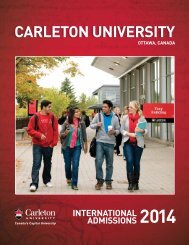carleton.ca Criminology and Criminal Justice - Carleton University
carleton.ca Criminology and Criminal Justice - Carleton University
carleton.ca Criminology and Criminal Justice - Carleton University
Create successful ePaper yourself
Turn your PDF publications into a flip-book with our unique Google optimized e-Paper software.
<strong>Criminology</strong> <strong>and</strong><br />
<strong>Criminal</strong> <strong>Justice</strong><br />
<strong><strong>ca</strong>rleton</strong>.<strong>ca</strong>
Crime <strong>and</strong> criminal justice are the focus of much<br />
public concern in Canada today.<br />
There is strong dem<strong>and</strong> for specialists in areas such<br />
as law enforcement, the criminal courts system,<br />
correctional services, public policy <strong>and</strong> law reform.<br />
<strong>Carleton</strong> <strong>University</strong> offers a multidisciplinary<br />
approach to this complex field. The Bachelor of Arts<br />
(Honours) program in <strong>Criminology</strong> <strong>and</strong> <strong>Criminal</strong><br />
<strong>Justice</strong> incorporates elements of law, psychology <strong>and</strong><br />
sociology to provide students with a comprehensive<br />
<strong>and</strong> relevant approach to the field <strong>and</strong> the opportunity<br />
for work experience through a wide range of<br />
placements.<br />
As a student of <strong>Criminology</strong> <strong>and</strong> <strong>Criminal</strong> <strong>Justice</strong>,<br />
you will acquire an in-depth underst<strong>and</strong>ing of the<br />
<strong>ca</strong>uses <strong>and</strong> definitions of crime, criminal behaviour,<br />
criminal law <strong>and</strong> its administration, <strong>and</strong> social <strong>and</strong><br />
institutional responses to crime.<br />
<strong>Carleton</strong>’s unique multidisciplinary approach not<br />
only provides the broad background needed to master<br />
this complex field, but also offers you the opportunity<br />
to specialize in one of the three disciplines—law,<br />
psychology <strong>and</strong> sociology—that are part of the<br />
program. This specialization is reflected as a<br />
concentration on your diploma.<br />
A <strong>Carleton</strong> degree will prepare you for a diverse range<br />
of future employment opportunities in criminal<br />
justice <strong>and</strong> provides a superb basis for further<br />
professional <strong>and</strong> graduate studies.<br />
The <strong>ca</strong>pital advantage<br />
<strong>Carleton</strong>’s lo<strong>ca</strong>tion in the nation’s <strong>ca</strong>pital provides<br />
many unique advantages to you as a student of<br />
<strong>Criminology</strong> <strong>and</strong> <strong>Criminal</strong> <strong>Justice</strong>.<br />
The Supreme Court of Canada, the Department<br />
of <strong>Justice</strong>, Correctional Services Canada, <strong>and</strong> the<br />
National Headquarters of the RCMP are all lo<strong>ca</strong>ted in<br />
Ottawa, providing unparalleled research <strong>and</strong> learning<br />
opportunities.<br />
The <strong>Carleton</strong> advantage<br />
H<strong>and</strong>s-on learning<br />
A distinctive feature of our program is the<br />
opportunity to complete a field placement.<br />
This h<strong>and</strong>s-on work experience allows you to develop<br />
your professional skills, as well as integrate your<br />
theoreti<strong>ca</strong>l knowledge, in a practi<strong>ca</strong>l setting. You<br />
will have a range of placement possibilities to choose<br />
from, including front line work with offenders <strong>and</strong>
victims, police, Crown attorneys <strong>and</strong> lawyers, <strong>and</strong><br />
with researchers <strong>and</strong> policy analysts in criminal<br />
justice <strong>and</strong> crime prevention.<br />
Expert faculty<br />
At <strong>Carleton</strong>, you will be taught by distinguished<br />
professors who are well recognized as national or<br />
international experts in their field.<br />
Faculty members participating in the program from<br />
the departments of law, psychology <strong>and</strong> sociology are<br />
specialists in the area of criminology <strong>and</strong> criminal<br />
justice.<br />
Choosing the right program<br />
Bachelor of Arts (General)<br />
Bachelor of Arts (Honours)<br />
The Bachelor of Arts (BA) degree in <strong>Criminology</strong> <strong>and</strong><br />
<strong>Criminal</strong> <strong>Justice</strong> is offered through <strong>Carleton</strong>’s Faculty<br />
of Public Affairs primarily as a four-year Honours<br />
program. The Honours program provides a strong<br />
emphasis on research methodology, establishing a<br />
solid foundation for further studies. If you choose<br />
the concentration in sociology, you are required to<br />
complete 13.5 of your 20.0 credits across the three<br />
disciplines of the program (law, psychology <strong>and</strong><br />
sociology). For those who pursue a concentration<br />
in either law or psychology, you will be required to<br />
complete 14.0 of your 20.0 credits across the three<br />
areas of study. The remaining credits needed for your<br />
degree are considered free electives, allowing you to<br />
choose from a wide variety of courses available at the<br />
university.<br />
A three-year General program is available for<br />
community college students whose programs are<br />
covered by an articulation agreement with the<br />
university <strong>and</strong> for students in the Honours program<br />
who later wish to apply <strong>and</strong> transfer to the three-year<br />
General degree program.<br />
Core courses<br />
All students must complete a concentration in one of<br />
the three disciplines of law, psychology <strong>and</strong> sociology.<br />
Course selection <strong>ca</strong>n be matched to your specific<br />
interests <strong>and</strong> <strong>ca</strong>reer goals in the discipline you<br />
choose. The remainder of your courses <strong>ca</strong>n be chosen<br />
from other areas of study offered at the university.<br />
Your first year will include required introductory<br />
courses in criminology, sociology, psychology <strong>and</strong> law.<br />
In second year, you will be introduced to the topics<br />
of Canadian criminal law, forensic psychology,
theories of criminal <strong>and</strong> deviant behaviour <strong>and</strong> the<br />
relationship between crime <strong>and</strong> social structures.<br />
In your third year, you will take courses that deal<br />
with more specialized or specific areas of criminology<br />
<strong>and</strong> criminal justice.<br />
<strong>Criminology</strong> offers research methods courses in the<br />
areas not covered by the concentration requirements.<br />
Sociology offers a choice of courses that focus on<br />
Canadian criminal justice administration <strong>and</strong> policy<br />
or on selected issues within the criminal justice<br />
system.<br />
Psychology offers a course on theories of assessment<br />
<strong>and</strong> treatment of offenders.<br />
Law offers a choice of courses in histori<strong>ca</strong>l<br />
perspectives on the administration of criminal<br />
law, analysis of the criminal law process or an<br />
examination of the practices of punishment <strong>and</strong><br />
social control in Canada.<br />
Students in the Honours program will also have<br />
the opportunity to develop in-depth knowledge of<br />
research methods in third year.<br />
Field placement<br />
The field placement is offered at the third-year level<br />
to 80 third- <strong>and</strong> fourth-year appli<strong>ca</strong>nts who have the<br />
highest grade point average in their first- <strong>and</strong> secondyear<br />
required courses.<br />
The placement is supplemented by a seminar course,<br />
which allows opportunities to share field placement<br />
experiences, discuss current criminal justice issues<br />
<strong>and</strong> learn from guest speakers with expertise in<br />
various areas of the criminal justice system.<br />
Honours research projects<br />
In fourth year, there is also the opportunity to<br />
complete a research project conducted under the<br />
direct supervision of a faculty member from the<br />
Institute of <strong>Criminology</strong> or the departments of Law or<br />
Sociology.
Lesley Zannella,<br />
fourth-year student in<br />
<strong>Criminology</strong><br />
The atmosphere in the<br />
Institute of <strong>Criminology</strong><br />
<strong>and</strong> <strong>Criminal</strong> <strong>Justice</strong> is<br />
friendly, welcoming <strong>and</strong><br />
personable, while at the<br />
same time a<strong>ca</strong>demi<strong>ca</strong>lly<br />
rigorous. The institute<br />
provides an environment that truly promotes<br />
student engagement <strong>and</strong> encourages both<br />
personal <strong>and</strong> a<strong>ca</strong>demic growth. The institute’s<br />
administration has provided me with exceptional<br />
guidance <strong>and</strong> advice as well as valuable<br />
knowledge. The professors in the Institute of<br />
<strong>Criminology</strong> are remarkably accessible <strong>and</strong><br />
approachable. My field placement gave me a<br />
unique view of the professional world of the<br />
criminal justice system in Canada that has been<br />
indispensable in helping me make important<br />
decisions regarding potential <strong>ca</strong>reer pathways.<br />
My placement also gave me the opportunity<br />
to network within the field. My very positive<br />
experience over the past four years confirms<br />
that I made the right choice by choosing the<br />
<strong>Criminology</strong> program at <strong>Carleton</strong> <strong>University</strong>.<br />
Your first-year experience<br />
First-year Seminars<br />
First-year BA students are strongly encouraged to<br />
include a First-year Seminar (FYSM) in their firstyear<br />
course load. Our First-year Seminars will<br />
get you away from the lecture hall <strong>and</strong> give you<br />
the chance, in a small class of no more than 30, to<br />
discuss <strong>and</strong> debate topics with your classmates <strong>and</strong><br />
your professors. You will also get early <strong>and</strong> frequent<br />
feedback on class assignments <strong>and</strong> instruction in<br />
research, writing <strong>and</strong> study skills. Please note that an<br />
FYSM does not have to be in your major discipline.
A sample first year<br />
■■<br />
■■<br />
■■<br />
■■<br />
■■<br />
■■<br />
■■<br />
0.5 credit in Introduction to <strong>Criminology</strong><br />
(CRCJ 1000)<br />
0.5 credit in Introduction to Psychology I<br />
0.5 credit in Introduction to Psychology II<br />
1.0 credit in Introduction to Legal Studies<br />
1.0 credit in (Introduction to Sociology<br />
I <strong>and</strong> Introduction to Sociology II) or in<br />
Introduction to Sociologi<strong>ca</strong>l Perspectives<br />
1.0 credit in a First-year Seminar<br />
0.5 credit in electives<br />
Future opportunities<br />
The workplace<br />
Employment possibilities in criminal justice are<br />
found traditionally in:<br />
■■<br />
■■<br />
■■<br />
■■<br />
■■<br />
law enforcement;<br />
probation, parole <strong>and</strong> correctional services;<br />
community social services;<br />
research <strong>and</strong> policy analysis; <strong>and</strong><br />
law reform within the government sector.<br />
Graduate studies<br />
Graduates of any of our Honours programs in<br />
<strong>Criminology</strong> <strong>and</strong> <strong>Criminal</strong> <strong>Justice</strong> are well qualified<br />
to go on to graduate studies in a variety of fields<br />
including criminology, sociology <strong>and</strong> legal studies.<br />
If you think that you may wish to pursue an<br />
advanced degree, you are encouraged to investigate<br />
graduate programs early in order to ensure that your<br />
<strong>Criminology</strong> program meets the relevant graduatelevel<br />
requirements.<br />
Professional programs<br />
Many professional programs, including law <strong>and</strong><br />
social work, encourage well-rounded appli<strong>ca</strong>nts<br />
from a variety of backgrounds to apply. A <strong>Carleton</strong><br />
degree in <strong>Criminology</strong> <strong>and</strong> <strong>Criminal</strong> <strong>Justice</strong> provides<br />
a strong background for such programs <strong>and</strong> you are<br />
encouraged to pursue interests you may have in these<br />
fields after completing an undergraduate degree.
FAQs<br />
Why would I choose an Honours program?<br />
Honours programs have many advantages<br />
including offering more courses in your chosen<br />
field, as well as preparing you for graduate studies,<br />
professional programs <strong>and</strong> employment.<br />
When do I have to declare a major?<br />
You will need to choose a major by the end of your<br />
first year. Course registration is much easier for<br />
students who have declared a major so even if you<br />
are not 100 per cent certain, it is best to choose<br />
a major upfront <strong>and</strong> change it later if you need<br />
to. Students deciding to major in <strong>Criminology</strong><br />
at the end of their first year must also declare a<br />
concentration in law, psychology or sociology at<br />
the same time.<br />
Where <strong>ca</strong>n I go for a<strong>ca</strong>demic advice?<br />
In addition to a<strong>ca</strong>demic advising within the<br />
Institute of <strong>Criminology</strong> <strong>and</strong> <strong>Criminal</strong> <strong>Justice</strong>, our<br />
Student A<strong>ca</strong>demic Success Centre offers a range<br />
of services including a<strong>ca</strong>demic advising <strong>and</strong> free<br />
study-skill development workshops. Friendly<br />
a<strong>ca</strong>demic advisors are available by appointment<br />
year-round to assist you with your edu<strong>ca</strong>tional<br />
planning needs. <strong><strong>ca</strong>rleton</strong>.<strong>ca</strong>/sasc<br />
Admission requirements<br />
For admission to the <strong>Criminology</strong> <strong>and</strong> <strong>Criminal</strong><br />
<strong>Justice</strong> program, you must have the Ontario<br />
Secondary School Diploma (OSSD) or equivalent,<br />
including a minimum of six 4U/M courses.<br />
Your six 4 U/M courses must include 4U English (or<br />
Anglais).<br />
It is <strong>Carleton</strong> <strong>University</strong> policy to consider your best<br />
performance in any eligible course in the admissions<br />
assessment.<br />
Since the number of qualified appli<strong>ca</strong>nts may be<br />
greater than the number of available spaces, cut-off<br />
averages <strong>and</strong> required marks may vary. Please refer to<br />
our website at admissions.<strong><strong>ca</strong>rleton</strong>.<strong>ca</strong>/requirements<br />
for the current admission requirements.<br />
For more information<br />
...about the <strong>Criminology</strong> <strong>and</strong> <strong>Criminal</strong><br />
<strong>Justice</strong> program, please visit our website<br />
at <strong><strong>ca</strong>rleton</strong>.<strong>ca</strong>/criminology or consult the<br />
<strong>Carleton</strong> <strong>University</strong> Undergraduate Calendar at<br />
<strong>ca</strong>lendar.<strong><strong>ca</strong>rleton</strong>.<strong>ca</strong>/undergrad.
PUBLIC AFFAIRS<br />
Do you want more information?<br />
Please contact us at:<br />
Institute of <strong>Criminology</strong> <strong>and</strong> <strong>Criminal</strong> <strong>Justice</strong><br />
<strong>Carleton</strong> <strong>University</strong><br />
C562 Loeb Building<br />
1125 Colonel By Drive<br />
Ottawa ON K1S 5B6<br />
Canada<br />
Tel: 613-520-2588<br />
Fax: 613-520-6654<br />
Email: criminology@<strong><strong>ca</strong>rleton</strong>.<strong>ca</strong><br />
Website: <strong><strong>ca</strong>rleton</strong>.<strong>ca</strong>/criminology<br />
Undergraduate<br />
Recruitment Office<br />
<strong>Carleton</strong> <strong>University</strong><br />
315 Robertson Hall<br />
1125 Colonel By Drive<br />
Ottawa ON K1S 5B6<br />
Canada<br />
Tel: 613-520-3663<br />
Toll-free in Canada: 1-888-354-4414<br />
Fax: 613-520-3847<br />
Email: liaison@<strong><strong>ca</strong>rleton</strong>.<strong>ca</strong><br />
Website: <strong><strong>ca</strong>rleton</strong>.<strong>ca</strong>/admissions<br />
This document is available in a variety of<br />
accessible formats upon request. A request<br />
<strong>ca</strong>n be made on the <strong>Carleton</strong> <strong>University</strong><br />
website at: <strong><strong>ca</strong>rleton</strong>.<strong>ca</strong>/accessibility/request.<br />
Produced by Creative Services <strong>and</strong> printed by Graphic Services<br />
330-12 3M 02 2013

















